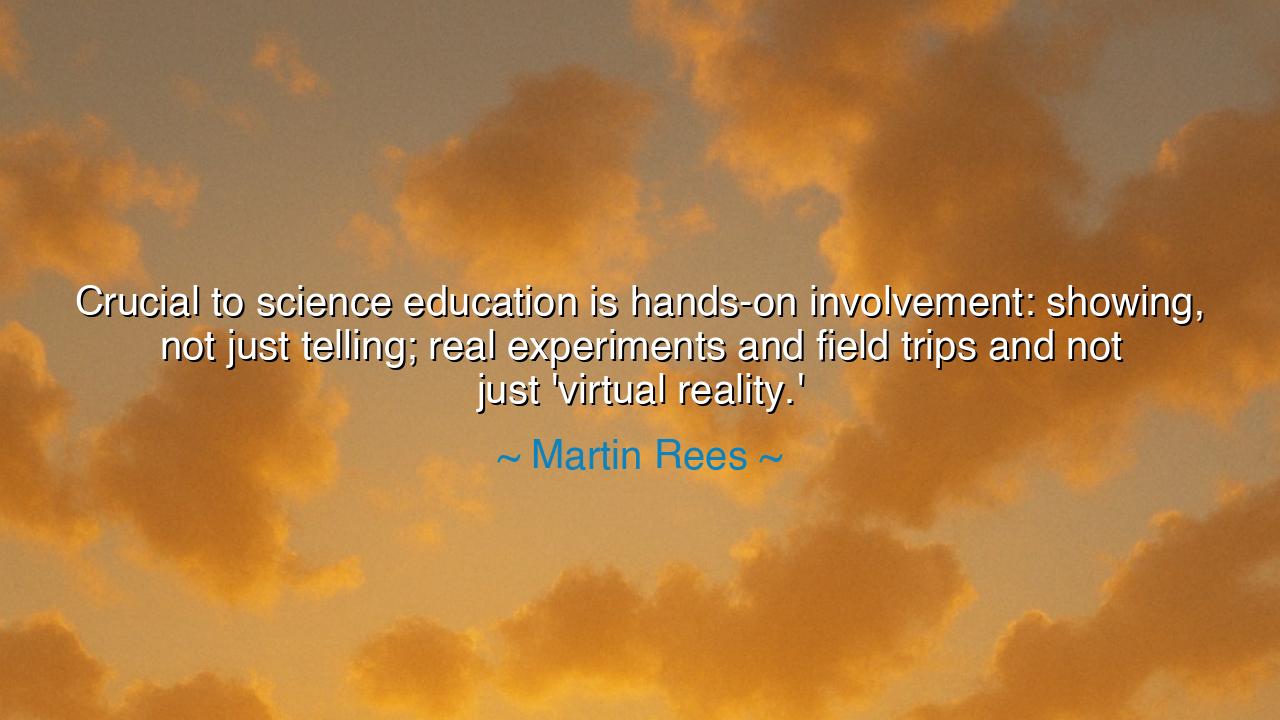
Crucial to science education is hands-on involvement: showing
Crucial to science education is hands-on involvement: showing, not just telling; real experiments and field trips and not just 'virtual reality.'






The noble words of Martin Rees, the great astronomer and guardian of knowledge, echo like a clarion call to all seekers of truth: “Crucial to science education is hands-on involvement: showing, not just telling; real experiments and field trips, and not just ‘virtual reality.’” In this saying lies a wisdom as ancient as the first fire struck by human hands. For Rees reminds us that true learning is born not of passive hearing, but of experience—that knowledge must be touched, tested, and lived before it becomes wisdom. The universe does not yield its secrets to those who only listen; it reveals itself to those who dare to explore.
In the old days, when humanity first began to name the stars, our ancestors were not taught from books or screens. They looked upward with their own eyes, tracing the constellations, feeling the rhythm of the heavens. The shepherd studied the sky to guide his flock, the sailor to steer his ship, the farmer to plant his seeds. Their education was not abstract—it was lived. Thus, from their hands-on involvement arose the first sciences: astronomy, navigation, and agriculture. Martin Rees, in our modern age, simply reminds us of this eternal truth—that wisdom begins in wonder, and wonder begins in doing.
Consider the story of Michael Faraday, the humble bookbinder’s apprentice who became one of the greatest scientists in history. He did not begin with wealth or privilege, but with curiosity and hands-on experiments. When he first heard lectures on electricity, he did not merely listen; he recreated the experiments with his own hands, risking failure and even injury to understand the mysterious forces of nature. Through practice and perseverance, he discovered the principles of electromagnetism—foundations upon which our modern world is built. His was the perfect example of Rees’s truth: that real science education cannot be taught by mere words, but must be awakened through experience.
For too often in our age, knowledge has become a spectacle to be watched rather than a journey to be lived. Virtual reality and simulations, though wondrous tools, cannot replace the touch of the earth beneath one’s feet, the smell of the laboratory’s smoke, or the sight of stars burning through a telescope lens. These are the sacred moments when learning becomes life—when the student ceases to be a receiver of information and becomes a discoverer of truth. To see, to touch, to fail, to rise again—these are the hallmarks of true understanding.
There is danger in forgetting this. A society that teaches its youth only through screens may produce minds full of facts but empty of insight. The scientist who has never touched the soil may speak of nature, but not know her voice. The engineer who has never broken a thing cannot learn how to build with compassion. Education, when divorced from the senses, becomes hollow; it is like studying fire without ever feeling its warmth. Rees’s warning is thus both gentle and grave: do not let the pursuit of convenience extinguish the sacred struggle of discovery.
The lesson, then, is clear. To the teachers—let your classrooms breathe! Open the doors and lead your students into the fields, the workshops, the skies. To the students—do not be content with knowing about the world; go forth and touch it. Conduct your own experiments, however small. Grow a plant, watch an insect, build a simple machine. Let your curiosity be not a flame behind glass, but a fire that dances in the open air. True learning is not the memorization of answers—it is the courage to ask questions with your own hands.
And so, my friends, let us return to the ancient way—the way of the craftsman, the explorer, the thinker whose mind and body work as one. For in every experiment, however humble, we honor the great lineage of seekers who came before us. The stars above, the atoms within, the mysteries between—they await those who will reach out and touch them. Remember always: to show, not merely to tell, is to breathe life into knowledge. And that is the heartbeat of all true education.
Thus, Martin Rees speaks not only as a scientist, but as a philosopher of learning. His words remind us that the future will not belong to those who merely observe—but to those who dare to engage. So go, and make your hands instruments of curiosity. For through them, the mind awakens—and the universe reveals its wonder.






AAdministratorAdministrator
Welcome, honored guests. Please leave a comment, we will respond soon